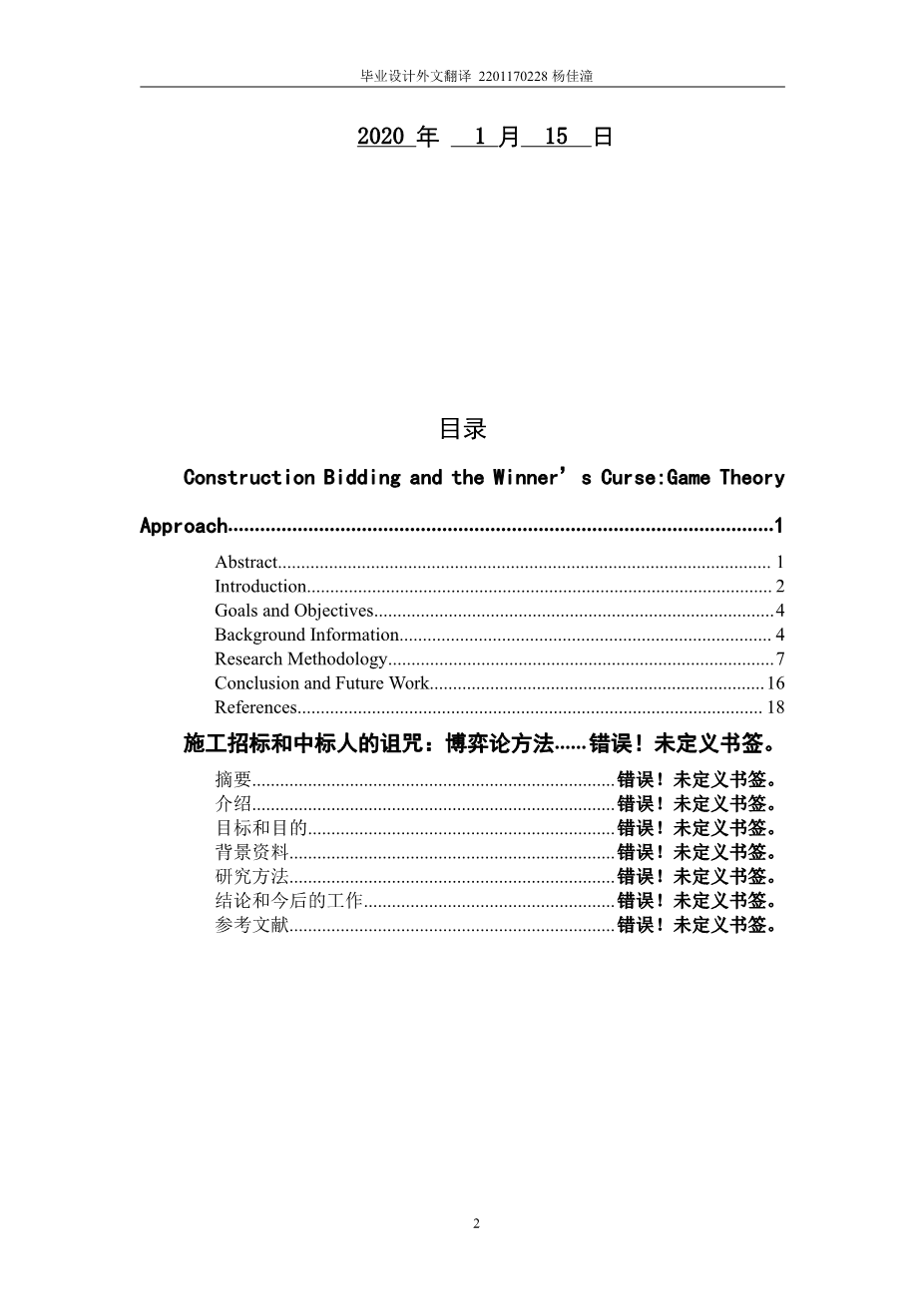
英语原文共 21 页,剩余内容已隐藏,支付完成后下载完整资料
目录
Construction Bidding and the Winnerrsquo;s Curse:Game Theory Approach 1
Construction Bidding and the Winnerrsquo;s Curse:Game Theory Approach
Muaz O. Ahmed1; Islam H. El-adaway, M.ASCE2; Kalyn T. Coatney3; and Mohamed S. Eid4
Abstract
In the construction industry, competitive bidding has long been used as a method for contractor selection. Because the true cost of construction is not known until the completion of the project, adverse selection is a major concern. Adverse selection is when the winner of the contract has underestimated the projectrsquo;s true cost. Thus, the winning contractor will most likely earn negative or at least below normal profits. The winnerrsquo;s curse is when the winning bidder submits an underestimated bid and is thus cursed by being selected to undertake the project. In the multistage bidding environment, where subcontractors are hired by a general contractor, the winnerrsquo;s curse may be compounded. In general, contractors suffer from the winnerrsquo;s curse for a variety of reasons including inaccurate estimates of project cost; new contractors entering the construction market; minimizing losses in case of recession of the construction industry; strong competition within the construction market; differential opportunity costs, which can affect the behavior of contractors; and the intention to win the project and then remedy the losses through change orders, claims, and other mechanisms. Using a game theory approach, this paper aims to analyze—and potentially reduce—industry exposure to the effects of the winnerrsquo;s curse in construction bidding. To this end, the authors identify the degree of the winnerrsquo;s curse in two common construction bidding environments; namely, single-stage bidding and multistage bidding. The objective is to compare the aforementioned two construction bidding environments and determine how learning from past bidding decisions and experiences can mitigate the winnerrsquo;s curse. To this end, and through defining the relationship between the construction bidding and auction theory, the authors utilized a three-step research methodology that involved (1) presenting the symmetric risk neutral Nash equilibrium (SRNNE) as an optimal bid function; (2) developing simulation models for single and multistage construction bidding processes; and (3) analyzing the results of the simulation models, which is based on an actual dataset of projects provided by the California Department of Transportation. This research demonstrated that the majority of general contractors and subcontractors suffer from the winnerrsquo;s curse in both single-stage and multistage bidding environments. Moreover, from a winnerrsquo;s curse perspective, the multistage bidding environment incurs more losses than the single-stage bidding environment. However, through learning from past experiences, the multistage bidding environment provides contractors with a better opportunity to avoid the winnerrsquo;s curse if compared with the single-stage bidding environment. This research should be beneficial for the profession to better understand the bidding decision-making processes. For future work, cooperative game theory can be applied with the integrated project delivery principles to help all associated parties mutually achieve their project objectives. DOI: 10.1061/(ASCE)CO.1943-7862.0001058. copy; 2015 American Society of Civil Engineers.
Author keywords: Contracting.
Introduction
Understanding the basic processes within the construction industry is essential for contractors to remain competitive, and also for a nationrsquo;s economy to operate effectively and efficiently. According
|
1 M.Sc. Student, Dept. of Civil and Environmental Engineering, Mississippi State Univ., 501 Hardy Rd., 235 Walker Engineering Bldg., Mississippi State, MS 39762. E-mail: moa31@msstate.edu 2 Associate Professor and Construction Engineering and Management Program Coordinator, Dept. of Civil and Environmental Engineering, Univ. of Tennessee, 851 Neyland Dr., 417 John D. Tickle Bldg., Knoxville, TN 37996 (corresponding author). E-mail: eladaway@utk.edu 3 Associate Professor, Dept. of Agricultural Economics, Mississippi State Univ., 255 Tracy Dr., 102 Lloyd-Ricks Watson Bldg., Mississippi State, MS 39762. E-mail: coatney@agecon.msstate.edu 4 Ph.D. Candidate, Dept. of 剩余内容已隐藏,支付完成后下载完整资料 资料编号:[259082],资料为PDF文档或Word文档,PDF文档可免费转换为Word |
以上是毕业论文外文翻译,课题毕业论文、任务书、文献综述、开题报告、程序设计、图纸设计等资料可联系客服协助查找。


